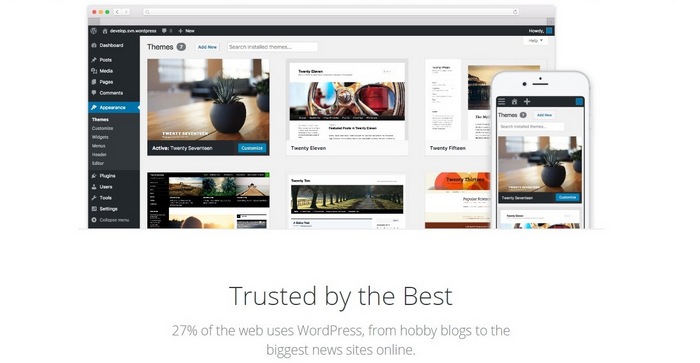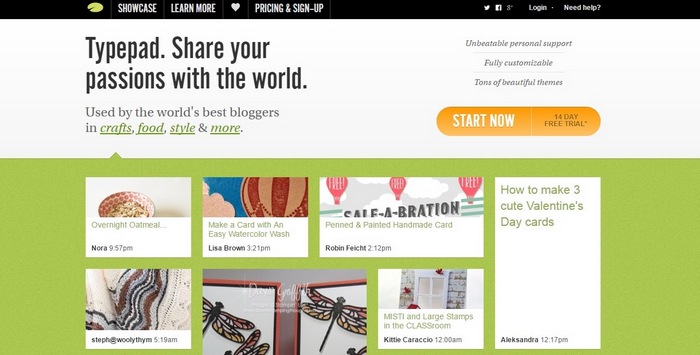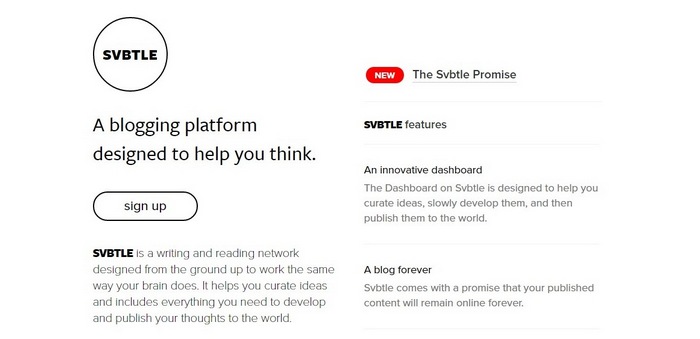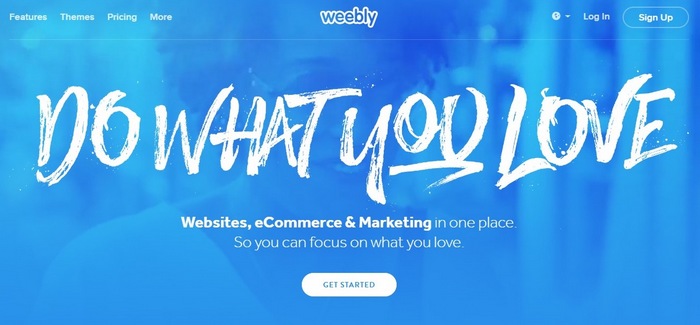Top 15 Blogging Platforms – A Detailed Comparison
Should I spend money to start my own blog or build it on a free platform?
It’s a question we all wonder before starting our first blog. Because, let’s face it, we all want to save money.
Creating a blog of your own can be challenging. You can’t possibly know how successful your blog will become, or whether or not you’ll receive thousands of visitors per day or if it could generate thousands of dollars every month. You have to take a chance to know for sure.
But, if you can learn how to start a blog properly, you will be one step closer to success. You can start that journey by learning about the different platforms you can use for setting up different types of blogs.
There are many different blogging platforms available today that are suitable for building different types of blogs from personal blogs, to hobby blogs and even for setting up a small business blog. In this comparison guide, we’ll show you the best platforms you can use to start any kind of a blog you want.
- WordPress.org
- WordPress.com
- Medium
- Tumblr
- Joomla
- Blogger.com
- Wix
- Squarespace
- Ghost.org
- TypePad
- SVBTLE
- LinkedIn Pulse
- Drupal
- Weebly
- Jekyll
01. WordPress.org [Recommended]

- Price: Free
- Domain Name: Not Provided.
- Web Hosting: Not Provided.
- Themes: Over 4,400 themes.
- Best For: Beginners, Professionals, and Businesses.
WordPress is the most popular and the most recommended CMS (Content Management System) available today. Some of the biggest website on the web, such as TechCrunch, CNN, and Bloomberg uses WordPress to power up their websites. It’s mostly popular because of its flexibility and ease of use. And also because it allows you to build your blog on your own terms.
Need a beautiful theme for your WordPress blog? No problem. There are thousands of themes available on the official WordPress directory, which you can use for free to design your website. Or you can select from thousands of other premium themes available on third-party marketplaces.
The plugins are another feature that makes WordPress so unique. Using various plugins, you can easily setup your own online shop to sell products, collect email addresses with pop-up messages, boost website SEO, and do much more without any web development or coding experience.
WordPress software itself is free to download and use. However, in order to setup your blog, you will need to purchase a domain name and a web hosting plan separately to host your website. Choosing a hosting provider like SiteGround, which offers special web hosting plans WordPress blogs would make your website setup process much easier.
If you need guidance on setting up a WordPress website, be sure to check out our step-by-step tutorial and web hosting comparison.
02. WordPress.com

- Price: Free or $2.99 per month.
- Domain Name: Free sub-domain.
- Web Hosting: 3GB free space.
- Themes: Over 100 free themes.
- Best For: Beginners
Not to be confused with WordPress.org software, WordPress.com is a platform built by Automattic, the company behind WordPress software. This platform allows you to start a blog almost instantly without having to worry about web hosting or setting up WordPress on your own.
The free plan allows you to build a blog with limited features under a WordPress.com subdomain name (eg-: yourname.wordpress.com) and in exchange WordPress will show their ads on your blog. You also won’t be able to customize your blog theme the way you want or show your own ads.
You can switch to a paid plan, which starts at $2.99 per month, to remove ads and get a custom domain name. Still, you won’t be able to monetize your blog and add your own ads unless you switch to the $8.25 per month plan.
03. Medium

- Price: Free
- Domain Name: Not provided.
- Web Hosting: Unlimited
- Themes: Not available.
- Best For: Beginners, marketers, freelancers.
Medium is a new and a growing blogging platform founded by Twitter co-founder Ev Williams. This platform is for just writing. No installation of software, no theme customizations, no advertising, and no premium plans. It’s just a place to freely write and share your stories.
If you’re interested in writing for fun or building some reputation for yourself or your brand for free, Medium can be a great place to start because the platform receives millions of readers every month.
Some of the people who use the platform to host their blogs include Jeff Jarvis, Tim O’Reilly, Hillary Clinton, and the US White House.
You can sign up for a Medium account for free and get started writing. You can also use a custom domain name if you already own one.
04. Tumblr

- Price: Free
- Domain Name: Free sub-domain.
- Web Hosting: Unlimited
- Themes: Over 100 themes.
- Best For: Beginners
Tumblr started out as a microblogging platform, then slowly turned into a social network where people mostly share GIFs and memes. The platform is popular among NSFW and adult content bloggers for its user-friendly content policy.
Tumblr comes with a limited number of free and premium themes for customizing your blogs. If you have a custom domain name, you can also configure your blog to use it instead of the free sub-domain name Tumblr provides.
The platform already has a community of users, so getting people to read your content won’t be too difficult when blogging on Tumblr. However, the platform is not suitable for serious bloggers who aims to become professional bloggers because of its limited customization options.
05. Joomla

- Price: Free
- Domain Name: Not provided.
- Web Hosting: Not provided.
- Themes: Not Provided.
- Best For: Advanced users.
Joomla is a CMS software, similar to WordPress but more complex. Getting around Joomla is more difficult than WordPress and it’s mostly suitable for advanced users who are willing to put in some time to learn how to use the platform.
Although, Joomla is a powerful platform for building not just blogs, but many other types of websites as well. It comes with hundreds of useful modules for customizing your blog or website however you like.
Just like WordPress, you’ll need to purchase web hosting to setup a Joomla blog. And you will also have to find Joomla themes to customize the design on your own.
06. Blogger.com

- Price: Free
- Domain Name: Free sub-domain.
- Web Hosting: Free 1GB space.
- Themes: Limited number of themes.
- Best For: Beginners and personal bloggers.
The Google-owned blogging platform has been providing free space for bloggers since 1999 and it’s still alive and kicking. According to Google, millions of people are still using Blogger to host their blogs.
Blogger is a great platform to build a basic blog because it gives you the freedom to customize the design of your website however you like and even monetize your website with ads for free.
However, there’s only a limited number of themes available for Blogger websites and most of those template designs are now considered as outdated. This may hurt your credibility when building a professional blog. But, for a simple personal or a hobby blog, Blogger is more than enough.
07. Wix

- Price: Free or $4.50 a month.
- Domain Name: Free sub-domain.
- Web Hosting: Free 500mb space.
- Themes: Over 100 templates.
- Best For: Beginners.
Wix is more than just a website builder, it’s also a great platform to build a blog as well. The service offers a number of beautiful template designs for setting up blogs and many other types of websites.
The free plan allows you to build a blog on a Wix.com sub-domain with 500mb of space and 500mb of bandwidth. In return, you’ll see Wix branded ads appearing on your blog when using the free plan. Upgrading to a paid plan, which starts at $4.50 a month, will allow you to get more storage and use a custom domain name.
Wix is not suitable for serious bloggers. Its customization options are limited and you have very small control over your content. But it can be a good place to host a basic personal blog.
08. Squarespace

- Price: $12 per month.
- Domain Name: Free domain with an annual plan.
- Web Hosting: Unlimited space.
- Themes: Over 100 templates.
- Best For: Beginners and businesses.
Squarespace is another website building platform, similar to Wix, that allows you to easily setup websites without coding knowledge. You can also use it to create a simple blog with a beautiful design.
The platform is mainly suitable for building a business blog. That way, you can host both your business website and blog on the same platform. Otherwise, Squarespace is not an affordable solution for an individual or a professional to host a blog.
Check out our list of best websites built with Squarespace to see what kind of websites you can build using this platform.
09. Ghost.org

- Price: Free or $19 per month.
- Domain Name: Not provided.
- Web Hosting: Unlimited space (with paid plan).
- Themes: Over 100 templates.
- Best For: Personal bloggers.
Ghost is an open-source blogging software that you can download and use to host a blog of your own. The platform also provides hosting for setting up a blog with unlimited space for $19 per month.
Or you can get your own web hosting plan to host a Ghost blog. Unfortunately, at the moment, not all web hosting providers supports Ghost. So, check to see if your web host support the Ghost platform before purchasing a hosting plan.
Hosting a Ghost blog on a third-party platform is also a bit difficult because you’ll have to manually upload your custom themes through cPanel and you’ll have to update Ghost databases manually whenever a new version is released.
Ghost comes with a minimalist Post Editor for easily writing blog posts, but offers only few theme customization options and it’s difficult to implement advertisements into a Ghost blog. Ghost will be more suitable for building a personal blog rather than a professional blog.
10. TypePad

- Price: $8.99 per month.
- Domain Name: Not provided.
- Web Hosting:
- Themes: Over 1000 designs.
- Best For: Beginners
TypePad used to be a big blogging platform a few years ago, but with the rise of WordPress and other free platforms such as Medium and Blogger, TypePad’s value slowly declined. The platform, however, still doesn’t want to give up. They still offer the same services with the same out-dated blog designs for the same price.
Even though, there are a number of professionals who still use TypePad to host their personal blogs, including Seth Godin and Wil Wheaton.
You don’t need any experience to setup a blog with TypePad, but if you’re willing to spend $8.99 for a blog, there are far better platforms out there for building blogs with modern designs and better customization options.
11. SVBTLE

- Price: $6 per month.
- Domain Name: Free sub-domain.
- Web Hosting: Unlimited space.
- Themes: Not provided.
- Best For: Personal bloggers.
Svbtle is another minimalist blogging platform, similar to Ghost, with the main focus on offering a smooth writing and reading experience to its users. The platform comes with a strong promise to keep your published articles live forever, even if you decided to cancel its subscription.
The platform has a minimalist Post Editor that supports Markdown and lets you publish under a Svbtle sub-domain or use your own custom domain.
The lack of themes and personalization options makes Svbtle not suitable for professional bloggers, but it’s ideal for setting up a minimalist blog to share your personal opinions, thoughts, and ideas.
12. LinkedIn Pulse

- Price: Free
- Domain Name: Not provided.
- Web Hosting: Unlimited space.
- Themes: Not provided.
- Best For: Freelancers and marketers.
Even though LinkedIn is not technically a blogging platform, the professional social network recently added a new feature called Pulse, where its users can publish long-form articles and share them throughout the social network with other fellow professionals.
If you already have a LinkedIn account, you can create an article through your profile homepage. It’s as easy as that. But, you won’t be able to use custom themes or monetize your articles.
However, it provides a great opportunity for marketers to get more exposure for their content. Some bloggers even re-publish their blog articles on LinkedIn Pulse to get more page views.
13. Drupal

- Price: Free
- Domain Name: Not provided.
- Web Hosting: Not provided.
- Themes: Limited
- Best For: Advanced users.
Drupal is a popular CMS software, similar to WordPress and Joomla. But, why did we rank it so low on the list? Because, like Joomla, Drupal is not a blogging platform suitable for beginners.
Drupal is mostly used by industry blogs and magazines that cover multiple categories and topics because the software is capable of handling massive amounts of posts and content. However, getting around the platform requires some technical knowledge and can also be frustrating at times.
Drupal is free to download and use, however you’ll need a separate domain name and a hosting plan to setup a Drupal-powered blog.
14. Weebly

- Price: Free or $8 a month.
- Domain Name: Free sub-domain.
- Web Hosting: Free 500mb space.
- Themes: Limited.
- Best For: Beginners and businesses.
Weebly is a website building platform and it also supports blogging as well. The platform only offers a small number of themes for blogs. As a result, we had to rank it all the way down at #14.
However, Weebly is easy to use and allows you to setup a blog alongside a website. Which makes it more suitable for business blogging. While the free plan limits the customization and features of the platform, the paid plans will allow you to setup a custom domain and even sell products through your website.
Have a look at our best websites built with Weebly article for examples of different types of websites you can build using this platform.
15. Jekyll

- Price: Free
- Domain Name: Not provided.
- Web Hosting: Not provided.
- Themes: Limited
- Best For: Advanced users.
Jekyll is rarely recommended for bloggers because it’s not easy to setup a blog with this software. But, if you’re familiar with Github, Markdown, and some HTML & CSS, you’ll be able to setup a Jekyll powered blog with free hosting from Github.
Simply put, Jekyll turns your plain text into static web pages. Although, you won’t get any sleek post editors or stylish themes when using Jekyll. You’ll have to write and upload your articles manually.
Web developers and coders seem to love this platform. But, it’s certainly not suitable for beginners or professional bloggers.
How Do They Compare?
Each platform comes with its own unique features that make them special. Have a look at the comparison chart to see they all compare against one another.
| WordPress.org | Wix | Weebly | ||
|---|---|---|---|---|
| Price | Free | Free | Free | |
| Hosting Space Provided | No | 500 mb | 500 mb | |
| Free name Provided | No | Sub-domain | Sub-domain | Sub-domain |
| Free Themes | 4000+ | 100+ | Limited | |
| Beginner-friendly | Yes | Yes | Yes | |
| Website Customization | Yes | Limited | Limited | |
| Support for Monetization | Yes | No | No | |
| Ability to Sell Products | Yes | Yes | Yes | |
| Most Suitable For | Everyone | Beginners | Beginners | |
| Visit | Visit | Visit |
Why We Recommend WordPress.org
If all these choices seem too overwhelming for you, we recommend you to go with WordPress.org and setup a self-hosting blog of your own. You can get started for less than $100 and it will give you more control over how you can scale your blog in the future as well. Read our how to start a blog guide to learn about the things you need to create a self-hosted blog.
Freedom of speech and staying in control of your content matters. And a self-hosted blog will let you publish whatever content you like without having to follow the guidelines or rules of a platform or a service.
Which platform did you choose to build your blog and how was your experience using it? Share your thoughts in the comments.


Hi Roshan, have you tried Pixpa’s blogging platform? I’ve noticed their portfolio building platform to be simpler and more intuitive than Squarespace, but haven’t really tried their blogging feature. I’m now looking to add articles regularly apart from updating my portfolio regularly to get organic clients as well.